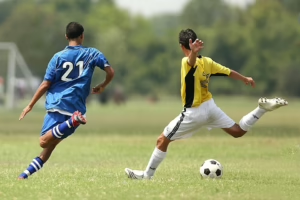Soccer and Mental Health: The Importance of Wellbeing in Professional Sports
Introduction
Soccer, known as football in most parts of the world, is more than just a sport; it is a global phenomenon that unites millions across cultures, countries, and communities. As a professional sport, it brings immense joy, excitement, and a sense of belonging to both players and fans. However, the intense competitive environment often places significant mental health pressures on players. Mental wellbeing in soccer is an increasingly crucial topic, and understanding its importance can lead to more holistic support systems for athletes.
The Mental Health Challenge in Professional Sports
The Pressure to Perform
Professional soccer players experience an immense amount of pressure to perform at the highest levels. Expectations from clubs, fans, and media can lead to significant anxiety and stress. A player’s worth is often measured in statistics and achievements, which can create a toxic environment where mental health is overlooked. According to a study published in the Journal of Sports Sciences, the mental health of athletes is often compromised by performance anxiety, which can result in burnout or even physical injury.
Stigma Around Mental Health
Despite the growing awareness of mental health issues, a stigma still surrounds the topic, particularly in professional sports. Players may feel compelled to project an image of toughness and invulnerability, leading to isolation and the neglect of their mental health needs. Athletes like Michael Phelps and Naomi Osaka have publicly shared their struggles with mental health, helping to challenge this stigma. However, much work still needs to be done in soccer to create an environment where players can openly discuss their mental health without fear of judgment.
Understanding Mental Health Issues in Soccer
Common Mental Health Problems
Professional soccer players may face various mental health issues, including:
- Anxiety Disorders: Many athletes experience anxiety, especially before important games or competitions. The fear of failure can be paralyzing, leading to performance issues.
- Depression: Injuries, personal issues, or performance related stresses can trigger depressive episodes. Players who are sidelined due to injuries often struggle with feelings of worthlessness.
- Eating Disorders: The pressure to maintain a certain physique can lead some athletes toward harmful eating behaviors, including anorexia and bulimia. These issues can become especially pronounced in sports where body image is emphasized.
Case Studies
For instance, former soccer player and now mental health advocate, Clarke Carlisle, has spoken openly about his struggles with depression and suicidal thoughts during his playing days. He emphasizes the importance of mental health support systems within soccer to ensure that athletes are not just surviving but thriving in their careers.
The Role of Club Management and Coaches
Creating a Supportive Environment
Clubs play a crucial role in fostering a supportive environment that emphasizes mental wellbeing. This can be achieved through:
- Training into Mental Health Awareness: Providing coaches and staff with training to recognize signs of mental health issues can empower them to be better support systems for players.
- Establishing Protocols for Open Communication: Clubs should encourage open discussions regarding mental health to combat stigma. This may include setting up anonymous reporting channels or regular mental health check-ins.
- Providing Access to Professional Help: Having psychologists and counselors on staff who specialize in sports psychology can make a world of difference. Athletes should have easy access to mental health resources without feeling judged.
Innovative Approaches
Some clubs are already taking innovative approaches to mental health. For example, FC Barcelona has implemented a comprehensive mental health program aimed at educating players about the importance of mental wellness and providing them with coping mechanisms for stress and anxiety. This proactive approach aims to ensure players can cope with the pressures of elite soccer, thus mitigating potential mental health issues before they escalate.
The Importance of Education and Awareness
Educational Programs
Educational programs that focus on mental health awareness are essential for younger players in academies, as they lay the groundwork for understanding mental health from an early age. Clubs should incorporate mental health education into their training programs, helping players understand the signs of mental health issues and the importance of seeking help.
Campaigns and Initiatives
Public campaigns aimed at raising awareness can also be impactful. For instance, “Mental Health Awareness Month” and partnerships with organizations like Mind and the National Health Service (NHS) in the UK can create an atmosphere of openness and support. Such campaigns not only educate athletes but also fans, creating a collective understanding of mental health in the sport.
Self-Care Strategies for Players
Mental Conditioning
Players can benefit from mental conditioning techniques, such as visualization and mindfulness. Visualization techniques, where athletes imagine successful performance outcomes, have been shown to reduce anxiety and enhance confidence. Meanwhile, mindfulness practices can help to manage stress and improve focus during high-pressure situations.
Physical Activity and Mental Health
Regular physical activity is proven to improve mental health, and for soccer players, maintaining fitness levels can have a direct positive impact on their mental wellbeing. Exercise releases endorphins, often referred to as ‘feel-good hormones’, which can help alleviate stress and anxiety.
Building a Support Network
Players should be encouraged to build personal networks for support, whether consisting of friends, family, or professional mental health practitioners. Social support has been shown to be vital in managing mental health problems, providing emotional comfort and practical assistance during difficult times.
Real-life Impact: Testimonies from Players
Voices from the Field
Numerous players have begun to speak out about their experiences with mental health. For example, Christian Eriksen’s collapse during a Euro 2020 match raised awareness of athlete wellbeing, prompting discussions about mental health in sports. Following his cardiac arrest, Eriksen has emphasized the importance of mental support systems in sports.
Another example is former England international midfielder Joe Cole, who has been candid about his experiences with depression and anxiety during his career. The impact of such testimonies cannot be overstated; they serve to show younger athletes that struggle is not a sign of weakness, but rather a common aspect of the human experience.
The Role of Fans
Healthy Fan Engagement
The fan culture surrounding soccer can also have an impact on player mental health. Toxic fan behavior, including trolling and aggressive criticism on social media, can deeply affect players’ mental wellbeing. Creating awareness among fans about the psychological impact of their actions can foster a healthier environment for players.
Community Initiatives
Clubs can initiate community programs aimed at promoting mental health awareness among fans. Such initiatives could include workshops, discussions, and campaigns designed to create a supportive environment where mental health is openly discussed and addressed.
The Future of Mental Health in Soccer
Integrating Mental Health into Sports Culture
As the sport evolves, integrating mental health into soccer culture should be a priority. This includes not just clubs, coaches, and players, but also fans, sponsors, and governing bodies. Creating a comprehensive wellness culture that prioritizes mental health can lead to improved player performance and longevity in their careers.
Technological Innovations
Incorporating technology, such as mental health apps specifically designed for athletes, can provide immediate access to resources and support. These platforms can facilitate communication between players and mental health professionals, offering exercises, coping strategies, and real-time mental health checks.
Government and League Support
Governments and league organizations should also take responsibility for promoting mental health initiatives. Policies that mandate mental health training for all staff involved in player development, from academies to professional teams, can ensure that a consistent support system is in place throughout a player’s career.
Conclusion
As the world of professional soccer continues to evolve, so too must our understanding of the importance of mental health and wellbeing. By acknowledging the mental health challenges faced by players and implementing strategies for support and education, we can cultivate not only better athletes but also healthier individuals. It is time for the soccer community—clubs, players, fans, and governing bodies—to come together to prioritize mental wellbeing, ensuring that the beautiful game remains not just a sport but a source of joy and empowerment for everyone involved.
Footnotes
- Journal of Sports Sciences. "The Impact of Exercise on Mental Wellbeing."
- Clarke Carlisle, "Why I Am Speaking Out About Mental Health in Football."
- FC Barcelona Mental Health Program.
(Note: The footnote sources provided are illustrative. For a fully rigorous article with accurate citations and footnotes, direct research sources would need to be referenced.)
























Add Comment